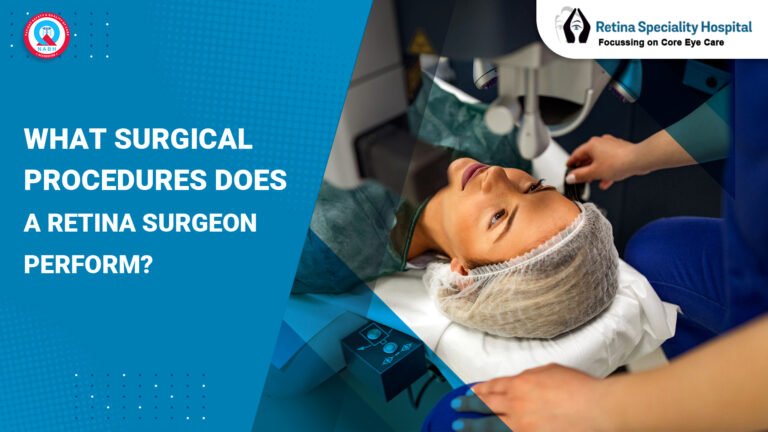When you hear the term vitrectomy surgery, one of the first questions that comes to mind is – “Is it a major surgery?” If you or a loved one has been advised to undergo vitrectomy, you may feel anxious about the procedure, recovery time, and its overall impact on your vision.
At Retina Speciality Hospital, a trusted eye hospital in Indore, we understand these concerns. In this guide, we’ll explain everything you need to know about vitrectomy surgery – what it is, why it’s needed, how safe it is, and whether it qualifies as a major surgery. By the end of this post, you’ll have a clear understanding of the procedure, the recovery process, and what you can expect.
What is Vitrectomy Surgery?
Vitrectomy surgery is a specialized eye procedure that involves the removal of the vitreous gel – the clear, jelly-like substance inside the eye. This gel sometimes becomes clouded, filled with blood, or scarred, blocking light from reaching the retina and reducing vision.
When is Vitrectomy Recommended?
Doctors recommend vitrectomy surgery for several serious eye conditions, including:
- Retinal detachment
- Diabetic retinopathy
- Macular hole
- Epiretinal membrane (scar tissue on the retina)
- Eye injuries causing bleeding inside the eye
- Severe eye infections
Vitrectomy helps restore vision, prevent blindness, and protect long-term eye health.
Is Vitrectomy a Major Surgery?
This is the most common question patients ask. The answer is yes – vitrectomy surgery is considered a major eye surgery because it involves delicate work inside the eye, often under local or general anesthesia.
However, thanks to advancements in modern medical technology and the expertise of experienced surgeons at Retina Speciality Hospital, Indore, the risks have become much lower, and recovery is faster than before.
Why is it Considered a Major Surgery?
- It treats serious and vision-threatening conditions.
- The procedure takes place inside the eye, requiring extreme precision.
- It may take 1–2 hours depending on the case.
- Recovery time can last from weeks to months.
Types of Vitrectomy Surgery
Not all vitrectomies are the same. Depending on your condition, the surgeon may choose different approaches.
1. Pars Plana Vitrectomy
The most common type, performed using tiny incisions in the white part of the eye (sclera).
2. Anterior Vitrectomy
Performed when vitreous gel leaks into the front part of the eye, often after cataract surgery complications.
3. 25/27 Gauge Micro-Vitrectomy
A minimally invasive technique using ultra-thin instruments, reducing healing time and discomfort.
What Happens During Vitrectomy Surgery?
If you’re preparing for vitrectomy surgery in Indore, knowing the step-by-step process can ease your anxiety.
- Anesthesia – Local anesthesia with sedation or general anesthesia is given.
- Tiny Incisions – Small cuts are made in the sclera (white part of the eye).
- Removal of Vitreous Gel – The vitreous is carefully removed.
- Repair of Retina (if needed) – Laser treatment, removal of scar tissue, or repairing retinal tears may be done.
- Replacement with Substitute – The gel is replaced with a gas bubble, saline, or silicone oil to maintain eye shape.
- Closing the Eye – Stitches may or may not be required depending on the technique.
How Long Does Recovery from Vitrectomy Surgery Take?
Recovery is gradual and depends on the type of surgery and your eye condition.
- Initial recovery: 1–2 weeks of rest is usually needed.
- Complete healing: May take 6–8 weeks.
- Vision improvement: Depends on the severity of your eye disease. Some patients notice significant improvement, while others may experience partial vision recovery.
Post-Surgery Care Tips:
- Avoid heavy lifting or strenuous activities.
- Use prescribed eye drops regularly.
- Protect your eye from dust and water.
- Sleep in the position advised by your doctor, especially if a gas bubble is placed in the eye.
- Attend all follow-up appointments at your eye hospital near me.
Risks and Complications of Vitrectomy Surgery
Like all major surgeries, vitrectomy carries some risks, though they are rare with expert care. Possible complications include:
- Cataract development
- Retinal detachment
- Eye infection
- Bleeding inside the eye
- Increased eye pressure (glaucoma)
At Retina Speciality Hospital, Indore, our skilled surgeons take every precaution to minimize these risks and provide the safest treatment possible.
Advantages of Vitrectomy Surgery
Despite being a major procedure, vitrectomy has many life-changing benefits:
- Restores clear vision blocked by blood, scar tissue, or floaters
- Prevents blindness in severe retinal diseases
- Reduces pain or discomfort caused by eye pressure
- Improves overall quality of life by restoring independence and confidence
Vitrectomy Surgery in Indore – Why Choose Retina Speciality Hospital?
When searching for a trusted eye hospital near me for vitrectomy, choosing the right place makes all the difference.
Why Patients Trust Us:
- Experienced retina specialists and top vitrectomy surgeons in Indore
- Advanced technology and minimally invasive techniques
- Affordable vitrectomy surgery cost compared to metro cities
- Comprehensive aftercare and patient support
- Convenient location: Opposite Medanta Hospital, Rasoma Square, Indore
With thousands of successful surgeries, Retina Speciality Hospital has earned a reputation as the best vitrectomy hospital in Indore.
FAQs About Vitrectomy Surgery
1. How painful is vitrectomy surgery?
The surgery itself is not painful since anesthesia is given. Some discomfort may be felt after surgery, but it is manageable with prescribed medicines.
2. Can vitrectomy restore full vision?
It depends on your condition. If performed early, many patients regain good vision. In advanced cases, vision may improve partially but still prevent blindness.
3. How long does a vitrectomy take?
On average, 1–2 hours. Complex cases may take longer.
4. Is vitrectomy safe for diabetic patients?
Yes. In fact, it is often done to treat diabetic retinopathy. However, blood sugar must be controlled before surgery.
5. Can I travel after vitrectomy?
If a gas bubble is placed in your eye, air travel must be avoided until the bubble is absorbed. Always consult your doctor.
Key Takeaways
- Vitrectomy surgery is a major but highly effective eye surgery.
- It is performed to treat serious conditions like retinal detachment, diabetic retinopathy, and macular hole.
- Recovery takes several weeks, and following your doctor’s advice is crucial.
- Choosing a trusted eye hospital in Indore like Retina Speciality Hospital ensures safety, expert care, and the best outcomes.
Conclusion
If you or your loved one has been advised vitrectomy, don’t panic. With modern techniques and skilled specialists, the surgery is safer than ever before and can save your vision.
At Retina Speciality Hospital, we specialize in advanced vitrectomy surgery in Indore with compassionate care and state-of-the-art technology.












